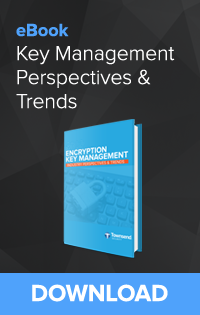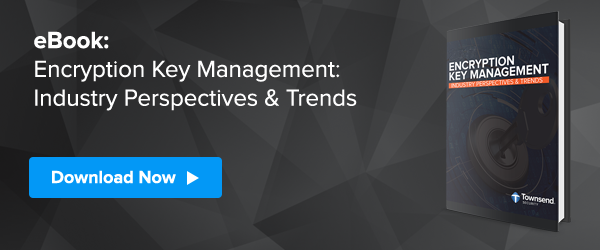Excerpt from the eBook "2016 Encryption Key Management: Industry Perspectives and Trends."
 While organizations are now committed to implementing encryption, they are still struggling with getting encryption key management right. With all major operating systems, cloud platforms, and virtualization products now supporting encryption, it is relatively easy to make the decision to activate encryption to protect sensitive data. But an encryption strategy is only as good as the method used to protect encryption keys. Most audit failures for customers already using encryption involve the improper storage and protection of encryption keys.
While organizations are now committed to implementing encryption, they are still struggling with getting encryption key management right. With all major operating systems, cloud platforms, and virtualization products now supporting encryption, it is relatively easy to make the decision to activate encryption to protect sensitive data. But an encryption strategy is only as good as the method used to protect encryption keys. Most audit failures for customers already using encryption involve the improper storage and protection of encryption keys.
Ignorance and fear are the driving reasons for this core security failure. Many IT professionals are still not versed in best practices for encryption key management, and IT managers fear that the loss of encryption keys or the failure of access to a key manager will render their data unusable. This leads to insecure storage of encryption keys in application code, unprotected files on the data server, and poor protection of locally stored keys.
Most encryption key management solutions have evolved over the last decade to provide unparalleled reliability and redundancy. This has largely removed the risk of key loss in critical business databases and applications. But the concern persists and inhibits the adoption of defensible key management strategies.
Take Aways
- Protect encryption keys with single-purpose key management security solutions.
- Never store encryption keys on the same server that houses sensitive data.
- Only deploy encryption key management solutions that are based on FIPS 140-2 compliant technology.
- Only deploy encryption key management solutions that implement the KMIP industry standard for interoperability.
- Avoid cloud service provider key management services where key management and key custody are not fully under your control.
Cloud Migration and Key Management Challenges
Cloud migration continues to a be a high priority for organizations large and small. The benefits for migrating to the cloud are clear. Reduction in cost for computing power and storage, leverage of converged infrastructure, reduction of IT administrative costs, on-demand
scalability, and many other benefits will continue the rapid migration to cloud platforms. As cloud platforms such as Amazon Web Services (AWS), Microsoft Azure, Google App and Compute Engine, and IBM SoftLayer mature we can expect the pace of cloud migration to accelerate.
While cloud service providers are providing some encryption key management capabilities, this area will continue to be a challenge. The question of who has control of the encryption keys (key custody) and the shared resources of multi-tenant cloud service providers will continue to be headaches for organizations migrating to the cloud. The ability to exclusively manage encryption keys and deny access to the cloud service provider or any other third-party will be crucial to a good cloud key management strategy and end-customer trust. The attempt by governments and law enforcement agencies to access encrypted data through access to encryption keys will make this issue far more difficult moving forward.
Unfortunately most cloud service providers have not adopted common industry standards for encryption key management. This results in the inability of customers to easily migrate from one cloud platform to another resulting in cloud service provider lock-in. Given the rapid evolution of cloud computing and the infancy of cloud computing, customers will have to work hard to avoid this lock-in, especially in the area of encryption key management. This is unlikely to change in the near future.
Take Aways
- Avoid hardware-only encryption key management solutions prior to cloud migration. Make sure your key management vendor has a clear strategy for cloud migration.
- Ensure that your encryption key management solution runs natively in cloud, virtual and hardware platforms.
- Ensure that your encryption key management solution provides you with exclusive management of and access to encryption keys. Neither your cloud service provider nor your encryption key management vendor should have administrative or management access to keys. Backdoor access through common keys or key management code is unacceptable.
- Avoid cloud service provider lock-in to proprietary key management services. The cloud is still in its infancy and retaining your ability to choose and migrate between cloud platforms is important.

